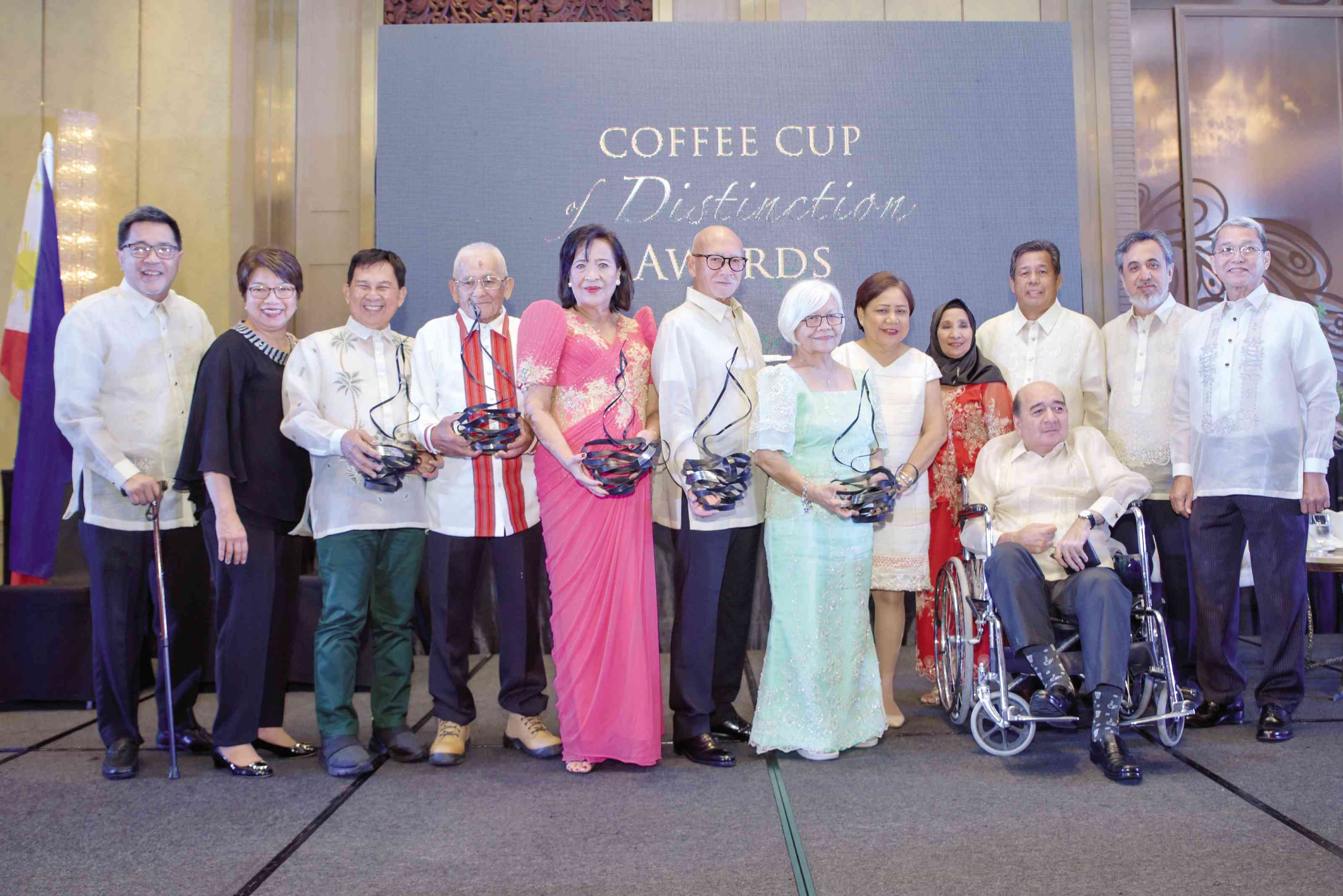Waking up the ‘sleepy’ PH coffee business

WINNERS CIRCLE. (From left) Guillermo Luz, Pacita Juan, Amado Silva, Prof. Benjamin Dimas, Evelyn Asuncion, Ernest Escaler, Ligaya Mercado, Sen. Cynthia Villar, Princess Lala Elorda, Nicholas Matti, Dr. Alejandro Mojica, Emmanuel Torrejon and Rene Tongson.
Five individuals who helped perk up the Philippines’ once listless coffee industry were presented the First Coffee Cup of Distinction Awards.
In simple ceremonies at Dusit Thani Hotel in Makati City, the Philippine Coffee Board, Inc. (PCBI) marked its 16th year by honoring Ernest de Leon Escaler of Gourmet’s Coffee, Jose Mercado of Café de Lipa, Dr. Amado Silva of Siete Baracos, Enrile and Evelyn Asuncion of Evrile Enterprises and Silca Coffee Roasting Company, and Professor Benjamin Dimas, founder of Benguet State University’s (BSU) Institute of Highland Farming Systems and Agroforestry.
Escaler, founder and president of one of the country’s biggest coffee traders, has been working to make the local bean at par with or even better than the world’s best.
The entrepreneur who considers coffee “part of my lifestyle,” pioneered the revival of the Philippine coffee export business.
Gourmet’s Coffee set up the first commercial roasting facility in the country and now produces various coffee products.
Article continues after this advertisementMercado was to coffee born, his family having drawn their livelihood from the farming and trading of the bean. He would tell people he was born in a coffee sack under a coffee tree. Mercado upholds both the family legacy and his birthplace’s history. Lipa City, where Café de Lipa is based, is where the seed of the country’s coffee industry was literally planted.
Article continues after this advertisementMercado wants to put the “zest” back in the country’s coffee production and agriculture, in general.
Coffee not only paid for the education of Silva and his siblings but also paid for his six sons’ way through college. His product’s brand name apparently comes from having seven men in the family—he and his sons. “Barako” (loosely translates to “tough guy” or “macho” in Batangueño) is the local name for liberica, which has a robust taste and scent and the main variety grown in Batangas.
Silva expressed willingness to help in any endeavor that would expand the market for barako.
The Asuncion couple started in 1975 as coffee traders in their hometown of Silang, Cavite, which became a new coffee production hub. They bought from farmers they personally knew and the relationship they cultivated with the producers gave them access to the best coffee beans.
The Asuncions went into the export business in 1980, with Boyd’s in Portland, Oregon, United States as their first client. By 1988, their company had become the fourth largest exporter of Philippine coffee to the US. The company started roasting its coffee in 2010, a fulfillment of the promise made by the late Enrile to their customers.
Dimas, founder of BSU’s Arabica Coffee-Benguet Pine Base Agroforestry, currently BSU’s Center of Arabica Coffee Research Development and Extension, said “After college, I started planting coffee trees under pine tress and was criticized for it.” Other experts scoffed at the idea.
In spite of the naysayers, Dimas said, “I was able to prove that coffee could grow under pine trees.”
He also developed other coffee-related technologies to support his innovation.
Guest speaker Senator Cynthia Villar expressed her family’s support for coffee saying, “Manny (Manuel, the former senator and presidential candidate and her husband) loves coffee … and started his own [coffee] business with the Coffee Project (a coffee shop chain).”
She mentioned legislation she sponsored to help farmers, particularly one that would establish farm schools in every town.
“Farmers lack technical expertise. They do not mechanize and they lack financial literacy,” she said. “The schools will make them more competitive and (their farms) profitable.”
PCBI’s Guillermo Luz said the Philippines was one of the few countries in the world that produced all four coffee varieties —liberica, arabica, robusta and excelsa.
For the award ceremonies, master chef Cyrille Soenen, drector of culinary arts of the Dusit Hospitality Management College and Dusit D2 The Fort, prepared a coffee-infused menu from appetizers to desserts.
PCBI, a coffee industry organization, is co-chaired by Nicholas Matti and Pacita Juan, who is also president. Juan said that since its establishment, the board had organized 10 coffee summits and organized at least one coffee event every month. —CONTRIBUTED